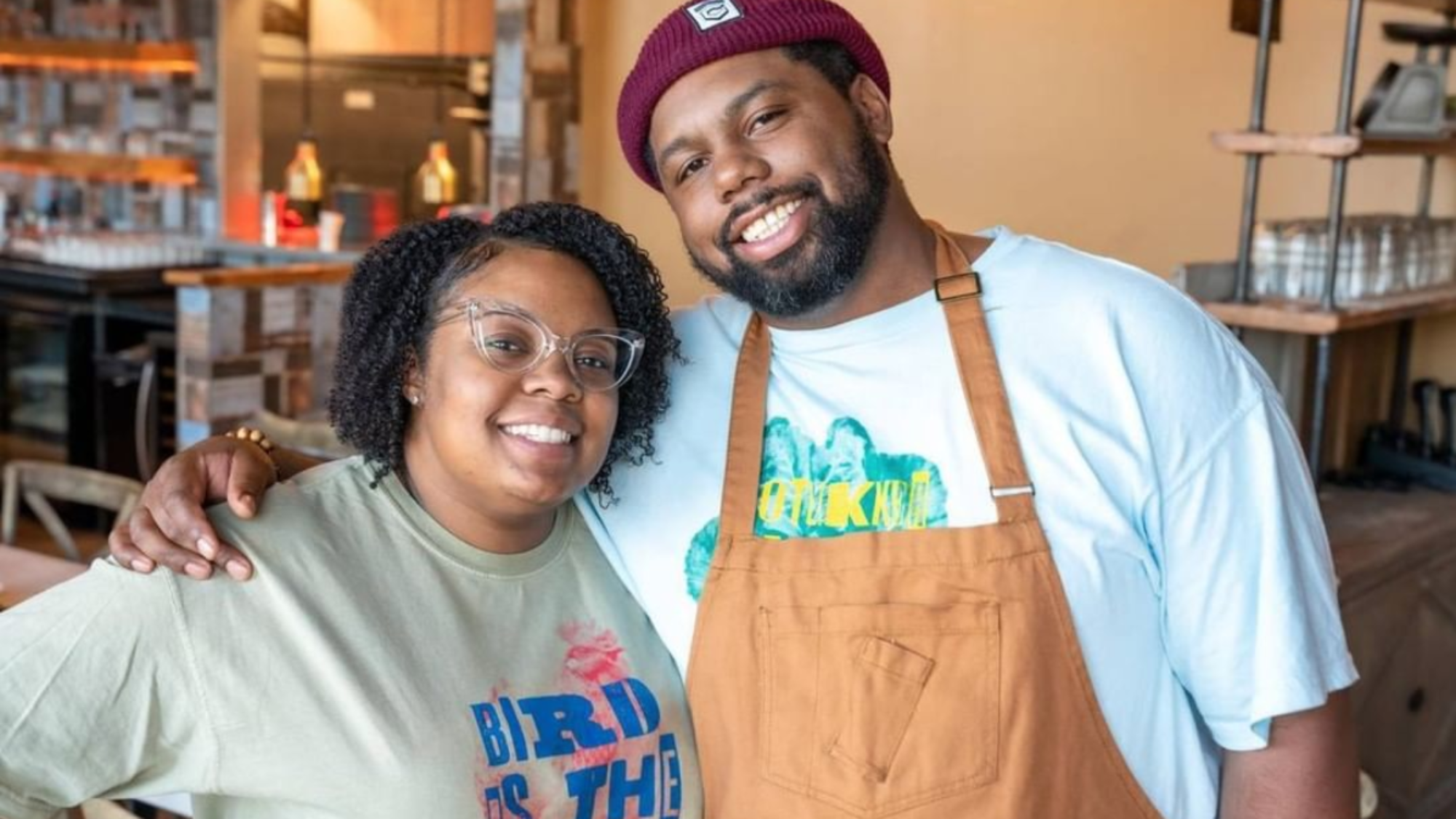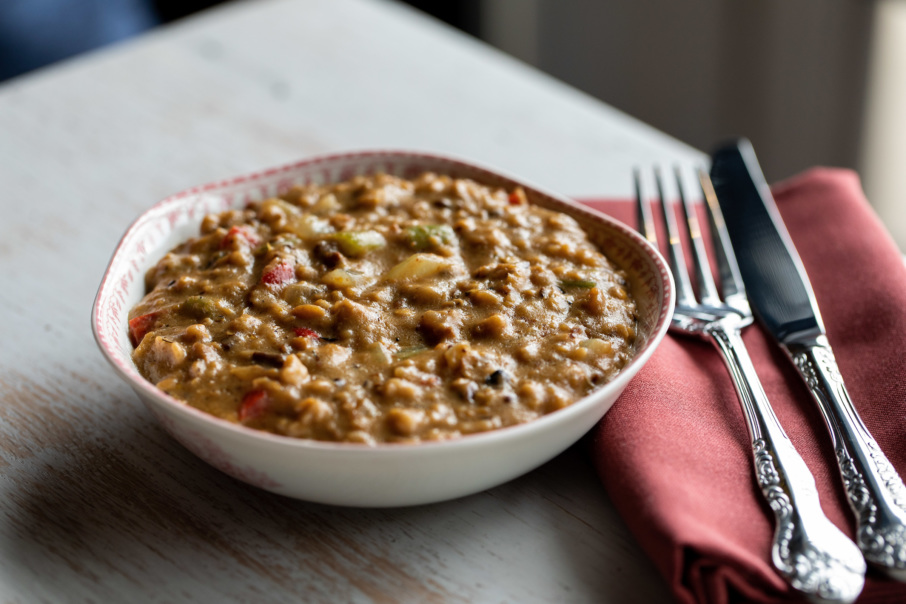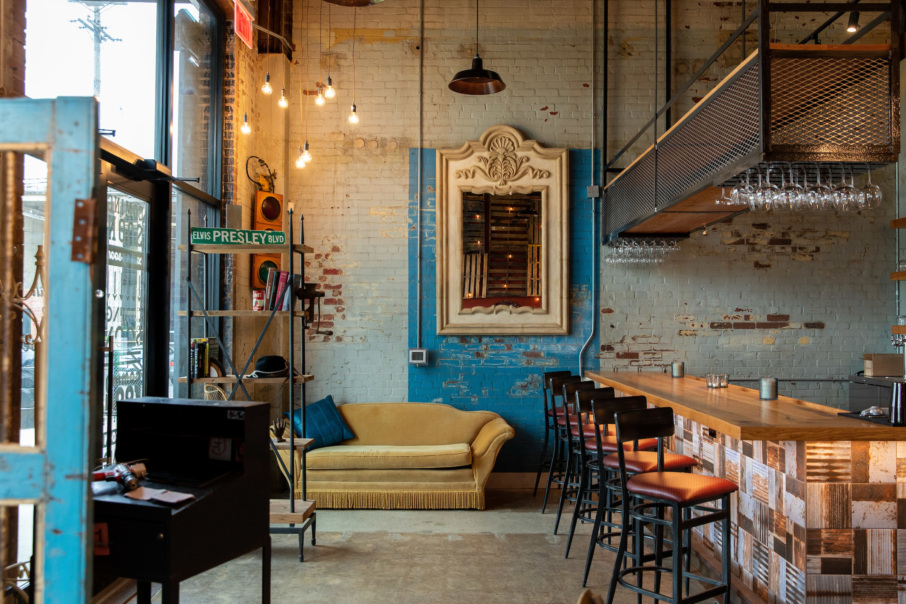Leah and Louise
Camp North End
Close

Chef Gregory Collier and his wife and restaurant partner, Subrina Collier, were days away from opening their second Charlotte restaurant, Leah & Louise, when the coronavirus pandemic shuttered dining rooms across America.
The two-time James Beard Award semifinalist for Best Chef: Southeast, along with Subrina and four other chefs — Gregory Williams, Jamie Barnes, Michael Bowling, and Jamie Suddoth — also co-founded The Soul Food Sessions in 2016 as a series of dining events meant to recognize and support people of color in the restaurant industry.
Leah & Louise is scheduled to open with reduced capacity seating on June 12. The Colliers’ first restaurant, The Yolk, is currently open for business.
Gregory Collier’s words follow.
*****
Subrina and I have both dealt with struggle and have had different hurdles to step over. COVID-19 is something we’ve never had to deal with, but for us, it doesn’t feel that different. It’s another struggle we have to navigate.
It’s just part of being black in America — in our minds, at least.
I think what’s happening right now is that a lot of people have woken up to understand that there’s a clear system that’s broken, and it needs to be fixed. It’s the beginning of a revolution. And the revolution looks multicolored.
*****
We co-founded a black food movement, The Soul Food Sessions, because we wanted to highlight black chefs in the community.
People think black people only cook soul food or Caribbean food; it’s always the perception of the lowest level of humble foods. People put their stereotypes on black chefs and they think that’s not racism — that’s just the way it is.
The reality is we are not allowed to do the things white chefs can do, because they are able to appropriate other cultures, because they think they’re better than those cultures, anyway. They’re doing us a favor. You would never interview a white chef and assume he cooks soul food.
People asked us why we needed to do an all-black chefs dinner. But they would never even consider why do we do all-white dinners. That’s the status quo. That’s the problem with whiteness. No one ever questions whiteness because it’s normal.
We need a complete overhaul of the system. We need to start closing our eyes, and using other senses, to start actually building a meritocracy like everybody likes to say America is. This is especially important in the food world, where they say it’s the only place you can work yourself up from the bottom.
No, you can’t. You can work yourself up to the middle. But you can’t work your way up to the top from the bottom. You have to look, talk, and act a certain way.
Black people started the hospitality industry in America. We were in the kitchens. We served the food. White people didn’t want to serve the food or cook the food. That only happened after the European revolution. Then it got cool. “We don’t want y’all in the kitchen no more.” Now we have to work our way back in the kitchen.
We literally built the South. How are you not talking about black chefs in the South, cooking Southern food?
With Soul Food Sessions, it wasn’t even about cooking Southern food. It’s about being in the South and cooking food. It’s become a place for mentorship, a place where young black chefs could see themselves.

We still want to mentor. We still want to do high-end dinners. We can cook elevated plates. We can be creative and do technical aspects of food and cook Southern food or not cook Southern food. We should be looked at the same way other chefs are. White chefs don’t lead with their ethnicity or their race or with the types of food they cook.
I’m not going to be hopeful. I’m going to be vigilant. I want to make sure I see some change. I want to make sure I collaborate with other black chefs and black restaurants. Collectively, how do we support black farmers? Black purveyors? Black food media? How do we support, directly, things that are run and operated by black folks?
*****
My message to diners is really simple. If you open your eyes and you get a plate of food from 10 different restaurants, you would pick differently than the way you do now.
The reason why the way you do it now is because you have cultural biases, based on race, based on neighborhood, based on price points, based on types of food. You have typified what you value and what you spend money on. That colonizes the dining room and fine dining to look a certain way. You would be willing to spend a lot of money on certain food — mostly French and mostly European — because that’s the food you have been conditioned to think that’s the most worthy food.
Food media is responsible for that. They get to determine who’s hot and what’s not. Food media and diners, we never really go to the roots of things. We never have enough discussions about Edna Lewis or Leah Chase or how Southern cuisine started.
There are people who do this work, like Toni Tipton-Martin, Thérèse Nelson, and Devita Davison, but it’s so easy for food media to find these cute little packages to put together and then they say, “Now you’re the person.” There’s a lack of authenticity about it. It’s about what’s cool and what’s hip. It’s about what you feel like looks the best to you today.
It doesn’t make any sense. Southern Foodways Alliance. Food & Wine. Bon Appétit. Resy. How many black people are on the staffs of these companies? It’s not proportionate to what America looks like. And it’s not going to be proportionate to what it looks like on the lower end. There will be a bunch of black folks, Latino folks, and Asian folks. What about the LGBTQ community, too?
We need to have more black food writers. We got a lot of dope-ass black food writers right now. A bunch. They need to work not just as freelance writers, but to be on the editorial staffs at places like The New York Times, Bon Appétit, Garden & Gun, Food & Wine, and Esquire.
I want food media to stop looking at the same all-white lineage from chefs like Thomas Keller or Grant Achatz. What’s the David Chang lineage? Or Edouardo Jordan? See who Mashama Bailey is training. See what Rodney Scott is doing with barbecue. We have to stop acting like these other people don’t exist.

I’m a two-time James Beard Foundation Awards semifinalist. It’s easy for food media to pick me; I appreciate them picking me. But don’t just stop with me. Keep looking in Charlotte. Keep looking for other black chefs. Keep the momentum going.
If you have 100 articles come out this week, make sure 10 are about black chefs and restaurateurs. That needs to happen consistently. We don’t want to be appeased for a moment. We want to be represented for a lifetime, just like everyone else is.
I just want publications to stop acting like they don’t know what diversity looks like and what it means — and make it a point to tell those stories. Stop thinking that you know what the best stories are. Go find somebody black to help you with that. If you’re an all-white staff, you don’t know. You don’t have these experiences. Find people of color to help you.
As publications get a little more conscious of the steps they’re taking and what they are doing, I think we will start to see multiple black chefs nominated and winning, not just a single black chef every year. We’ll have different years where there are two or three or four best new chefs who are black.
*****
I want the activism to continue. I want people to consider where they spend their dollars and how it positively or negatively impacts the community.
The black-owned restaurant lists are great, but are you actually going to support black businesses? That’s what I want to see. I want to see what happens after COVID and people are back in restaurants.
Are people actually supporting these restaurants, or are they just posting their support? Are they supporting because everybody posted a black screen? Posting doesn’t require nothing. It’s like taking a selfie. It doesn’t require any work. There are different levels to it.
As for people who say, “We don’t shop by race,” I ask them, where do you go? If you’re a white person, you go to places in your neighborhood and most likely, it’s filled with people who look like you. Almost all those restaurants are owned or operated by white people or white chefs. So yes, you do shop by race.
You are very aware of who goes to that restaurant. You went because you saw it on Yelp or saw it on an Eater article. You are indirectly shopping by race because you, America, surrounds yourself in whiteness. You don’t even have to think about it and you’re doing it.
People of color — Black folks, Asian folks, indigenous people, Latinx people — we didn’t create race. White people did. And they created racism.
It’s important for people who are allies to continue the conversation. It’s important for minorities to have conversations, about what we’re doing and how we can collectively keep pushing the culture forward.
If we don’t, we’ll revert back to doing the same thing we were doing before. There will be another protest, another murder. More riots. More performative activism. That’s not going to change the trend.
For the longest time, I have always thought that there was no possibility of change in America. I believe that might be shifting. The possibility of change is finally here.
*****
As told to Deanna Ting.
Gregory Collier is the chef and co-owner of Leah & Louise and The Yolk in Charlotte. Deanna Ting is a Resy staff writer. Follow her on Instagram and Twitter. Follow @Resy, too.